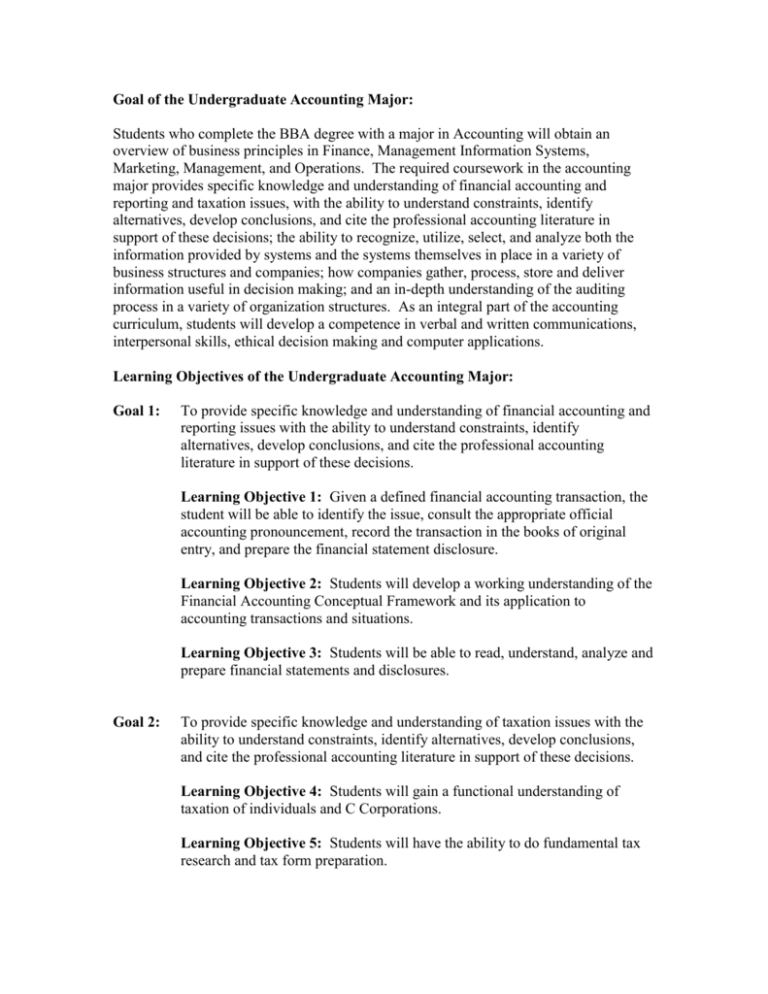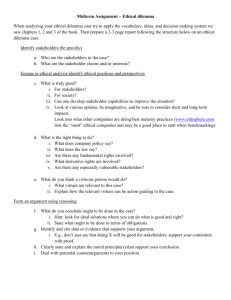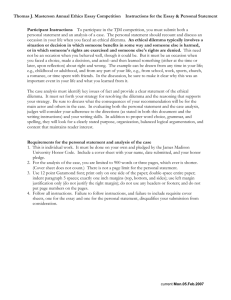Goal of the Undergraduate Accounting Major:
advertisement

Goal of the Undergraduate Accounting Major: Students who complete the BBA degree with a major in Accounting will obtain an overview of business principles in Finance, Management Information Systems, Marketing, Management, and Operations. The required coursework in the accounting major provides specific knowledge and understanding of financial accounting and reporting and taxation issues, with the ability to understand constraints, identify alternatives, develop conclusions, and cite the professional accounting literature in support of these decisions; the ability to recognize, utilize, select, and analyze both the information provided by systems and the systems themselves in place in a variety of business structures and companies; how companies gather, process, store and deliver information useful in decision making; and an in-depth understanding of the auditing process in a variety of organization structures. As an integral part of the accounting curriculum, students will develop a competence in verbal and written communications, interpersonal skills, ethical decision making and computer applications. Learning Objectives of the Undergraduate Accounting Major: Goal 1: To provide specific knowledge and understanding of financial accounting and reporting issues with the ability to understand constraints, identify alternatives, develop conclusions, and cite the professional accounting literature in support of these decisions. Learning Objective 1: Given a defined financial accounting transaction, the student will be able to identify the issue, consult the appropriate official accounting pronouncement, record the transaction in the books of original entry, and prepare the financial statement disclosure. Learning Objective 2: Students will develop a working understanding of the Financial Accounting Conceptual Framework and its application to accounting transactions and situations. Learning Objective 3: Students will be able to read, understand, analyze and prepare financial statements and disclosures. Goal 2: To provide specific knowledge and understanding of taxation issues with the ability to understand constraints, identify alternatives, develop conclusions, and cite the professional accounting literature in support of these decisions. Learning Objective 4: Students will gain a functional understanding of taxation of individuals and C Corporations. Learning Objective 5: Students will have the ability to do fundamental tax research and tax form preparation. Learning Objective 6: Students will have a fundamental understanding of the Internal Revenue Code, Treasury Regulations, and Case Law. Goal 3: The ability to recognize, utilize, select, and analyze both the information provided by systems and the systems themselves in place in a variety of business structures and companies. Learning Objective 7: Students will be able to recognize, utilize, select, and analyze information to support management decision-making, including the areas of controlling, planning, and directing within an organization. Learning Objective 8: Students will have an understanding of an entity's internal control and be able to identify and use the tools available for documenting the understanding of internal control. Goal 4: To understand how companies gather, process, store and deliver information useful in decision making. Learning Objective 9: The student will be able to explain how information technology impacts accounting. Learning Objective 10: The student will develop an understanding of how reliable information is provided to all stakeholders of the organization Goal 5: To develop an in-depth understanding of the auditing process in a variety of organization structures. Learning Objective 11: The student will be able to research and apply Generally Accepted Auditing Standards(GAAS). Learning Objective 12: The student will develop understanding of assurance services and the process of delivering those services to a variety of clients. Goal 6: As an integral part of the accounting curriculum, students will develop a competence in verbal and written communications, interpersonal skills, ethical decision making and computer applications. Learning Objective 13: The student will possess a competence in technology (computer applications) as it relates to, and integrates within, the field of accounting, including (but not limited to) the mastery of spreadsheets, word processing, presentations, databases, and other software as appropriate. Learning Objective 14: The student will be able to make both verbal and written presentations and will be able to communicate in a professional manner both verbally and in writing. Learning Objective 15: Given an ethical dilemma in business, the student will be able to recognize the ethical dilemma, apply an ethical framework, and develop a resolution to the dilemma. Learning Objective 16: The student will demonstrate the ability to work effectively within a team by fully participating in one or more team projects which produce a project that shows evidence of effective teamwork and competency in interpersonal skills. March 4, 2004






